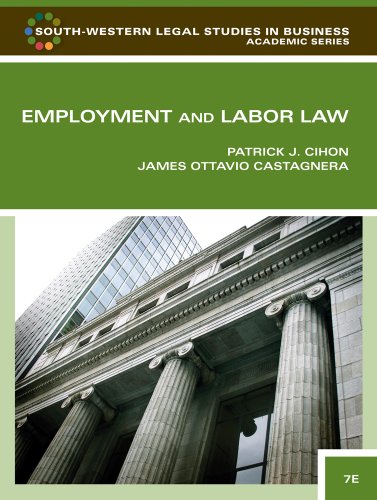The plaintiffs were boilermakers by trade and also union members. When boilermakers were needed on a construction
Question:
The plaintiffs were boilermakers by trade and also union members. When boilermakers were needed on a construction job, an agreement between the parent union and participating building contractors called “Southeastern States Articles of Agreement”
provided that the contractor would request that the union provide the workers and would employ those sent by the union if they were qualified. The controversy resulted from an incident in which the plaintiff boilermakers, upon arriving at the work site, found it picketed by a large and belligerent group from another trade, the pipefitters. It was agreed, for the purposes of the case, that the pipefitters’ acts and presence were illegal. The referred boilermakers made no attempt to pass through the picket line, and this impasse continued unbroken for several days.
After the weekend had passed, a replacement group of boilermakers appeared at the work site in a large body, led by the business agent. The newly recruited boilermakers went right through the line, but the pipefitters, along with the plaintiff boilermakers who had respected the picket lines the previous week, continued to hold off, standing apart. Soon thereafter, an official of the contractor came out from the job site and handed termination notices to all in that group, asserting absenteeism as the ground.
The record reflects a fear by the union that it would be in serious trouble if it could not improve its record of complying with its agreements with employers, and this incident of course involved not honoring illegal picket lines and thereby making the boilermakers abettors of illegal conduct by others.
The preceding situation is dealt with in a series of documents that were in evidence. The previously mentioned Articles of Agreement provide as follows:
1.4.4. There will be no recognition of any unauthorized or illegal picket line established by any person or organization, and the international and local officers of the Union will immediately upon being informed that such a situation exists, order all employees to cross such picket line.
The Joint Referral Committee Standards entered into by employers and union provides that a registrant is not to be referred for employment from the out-of-work list for ninety days after: 4.
Involvement in any unauthorized strike, work stoppage, slowdown, or any other activity having the effect of disrupting the job…. 6.
Insistence on recognizing illegal or unauthorized picket lines.
This ninety-day exclusion from referral was often called “benching” in the record of this case.
The employer demanded in writing that the rules be applied to seven men, including the plaintiffs herein, and accordingly, the Union Rules Committee notified all business agents nationwide, effectively blacklisting the offenders. One of the men was obliged to quit a job he had found in Florida. At the time of trial, the three plaintiffs did not yet have work as boilermakers, though the ninety days had long since expired. They were restored to the bottom of the out-of-work list—not to their previous seniority.
Evaluate the discipline handed out to these boilermakers and the manner in which it was meted.
Why were they disciplined? Were they accorded due process of law? See Turner v. Boilermakers Local 455
[755 F.2d 866 (11th Cir. 1985)].
Step by Step Answer:

Employment And Labor Law
ISBN: 9781439037270
7th Edition
Authors: Patrick J. Cihon , James Ottavio Castagnera





